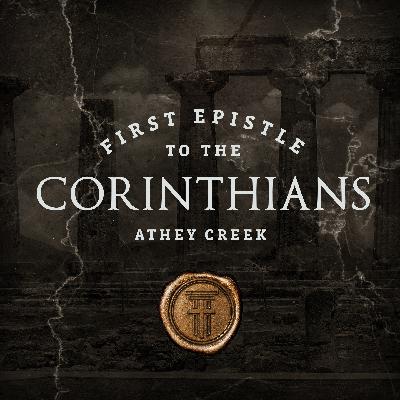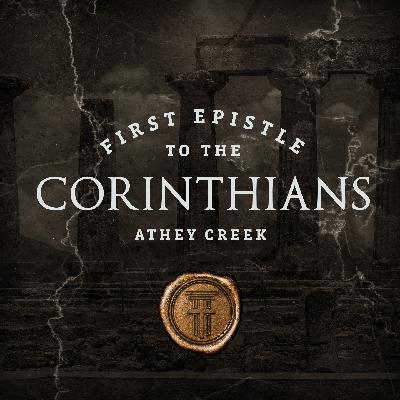Discover Athey Creek | Audio Podcast
Athey Creek | Audio Podcast

882 Episodes
Reverse
A Bible teaching titled “Through the Bible | 1 Corinthians 15” from 1 Corinthians 15 by Brett Meador.
Paul introduces a new topic to the church at Corinth in 1 Corinthians 15:50-53 by speaking of a future event known as the Rapture – a subject that continues to cause great debate, confusion, and controversy to this day. As we explore this topic, we clarify what the Rapture entails, address key questions and disagreements surrounding it, and examine how it is supported throughout Scripture.
Church services in Corinth had devolved into chaos with people speaking in tongues without interpretation, talking over one another, and abandoning any sense of order. As Paul steps in to correct these practices in 1 Corinthians 14, we learn why structure in worship is essential and how we can ensure our own churches operate in a manner that benefits the body of Christ and reaches unbelievers.
As one of the most famous, poetic, and frequently quoted passages in the Bible, 1 Corinthians 13 teaches us about the greatest spiritual gift believers can pursue. As we delve deeper into “The Love Chapter,” we learn what this truly means, how we can put it into practice, and who our ultimate example is to follow.
Paul begins his teaching on spiritual gifts in 1 Corinthians 12 by explaining the diverse ways God works through His people to bring unity and order within the church. As we study this passage, we learn about the Holy Spirit’s role in distributing the gifts, define the ones Paul lists, and examine some of the differing viewpoints that arise in the church today.
One of the problems Paul had to address in the Corinthian church was their limited understanding of how the body of Christ was meant to function together to form a healthy and unified church. In 1 Corinthians 12:12-27, he provides a spiritual anatomy lesson that helps us examine our own calling within the body of Christ and how we can contribute to keeping all members functioning as God intended.
The issues of head coverings, hairstyles, and gender roles seem just as controversial today as they were in the Corinthian church. As Paul addresses these concerns in 1 Corinthians 11:1-16, we learn how to discern the difference between tradition, culture, and Scriptural mandates, see God’s unique design and purpose for men and women, and are reminded that what we display outwardly often reflects what’s happening within our hearts.
Paul continues to address issues in the Corinthian church by confronting their improper behavior during communion. As he guides them on how to properly partake of the Lord’s Supper in 1 Corinthians 11:17-34, we learn the purpose behind this practice, how to approach it with reverence, and how to avoid the same mistakes the Corinthians were making.
Paul continues to help the Corinthian church understand the lines between legalism, liberty, and love in 1 Corinthians 10 by drawing upon examples from the Old Testament. As we look at the ways the Israelites erred while fleeing Egypt and journeying toward the Promised Land, we are warned to turn from immorality, idolatry, and ingratitude and instead pursue God’s glory and love others in all that we do.
In 1 Corinthians 10:31, Paul charges us to do everything for the glory of God. As we examine the reasons to heed his words, we see the benefits we are blessed with and the protection we receive when we honor Him instead of boasting in ourselves.
Paul tackles another controversy in the Corinthian church in 1 Corinthians 9 – and this time, he’s directly affected by their debate. As Paul explains why those in ministry should have the right to be financially supported, why he is willing to forgo wages from them, and what ultimately mattered most to him, we see a model for the modern-day church when it comes to compensating those serving in ministry.
The Corinthian church faced a major controversy about whether it was acceptable to eat meat sacrificed to idols, and Paul provides guidance on how they should handle it in 1 Corinthians 8. So why should we study an issue that was so specific to their situation, time, and culture? Because the principle behind it still applies, and Paul’s answer helps us navigate the many gray areas in our own society and discern what we should and shouldn’t do as Christians.
The Corinthian church had many questions about singleness, marriage, divorce, and remarriage, which Paul addresses in 1 Corinthians 7:10-40. As we listen to his answers, we step back to gain a comprehensive biblical understanding of God’s design for marital relationships and learn how to properly apply Scripture as we address these issues in our own day.
In 1 Corinthians 6:1-7:9, Paul continues to address the problems within the Corinthian church – many of which remain all too familiar among modern Christians. As he confronts matters such as lawsuits, sexual immorality, marriage and singleness, we see God’s design for how these should be handled and the consequences when we insist on doing things our own way.
Does Paul’s statement that “all things are lawful” in 1 Corinthians 6:12 mean we have the freedom to do whatever we want? While it might sound that way at first, as we unpack Paul’s argument, we discover what boundaries guard this statement, how this topic develops throughout Scripture, and how our liberty should be used to glorify God.
Paul begins to address the central issue of his letter in 1 Corinthians 5 as he directly confronts the serious problems within the Corinthian church. As he calls out a man willfully living in shocking sexual sin, Paul provides a blueprint for how the church should confront sin, when discipline is necessary, and how believers should respond to those living in blatant, unrepentant sin.
The Corinthian church had a serious problem with sexual immorality to the point that they were no longer even ashamed, but proud of it. Sadly, not much has changed since Paul had to confront them with the urgent command to “flee fornication” in 1 Corinthians 6:18. As we see why sexual immorality is so destructive, we discover how we can put Paul’s charge into action ourselves and how mercy and forgiveness can be found in the midst of sin.
In 1 Corinthians 4, Paul confronts some of the major issues within the Corinthian church as he seeks to correct their divisions over favorite leaders, their tendency to judge by wrong standards, and their prideful hearts. Through a blend of sarcasm, tenderness, and hard truth, Paul points them back to what God cares about and shows them how to view their leaders, their church, and their conduct towards others in light of the Gospel.
Paul’s sole focus was on faithfully carrying out what God had called him to do: preaching the Gospel of Jesus Christ. As Paul shares his mindset about his mission in 1 Corinthians 4:1-2, we pause to examine what God has called us to do personally and whether we are fulfilling our ministry faithfully with the single purpose of pleasing God.
The church at Corinth thought they were wise because they were worldly, yet they were spiritually immature and failing to build upon the right foundation. As Paul seeks to correct these deficiencies in 1 Corinthians 3, he lays out a roadmap for how they can grow into maturity, build wisely, and bear eternal fruit by keeping Christ at the center.







you are awesome pastor Brett